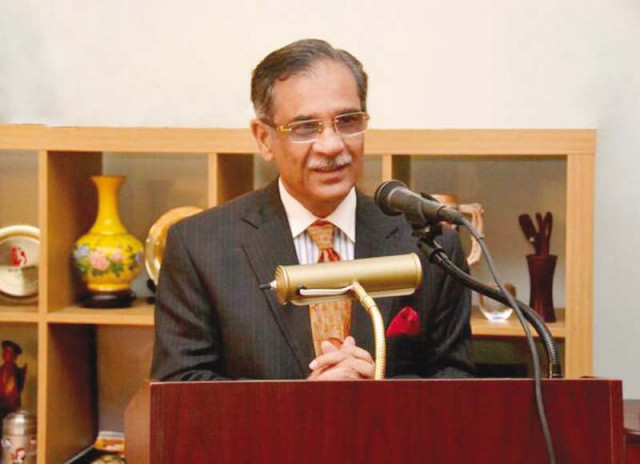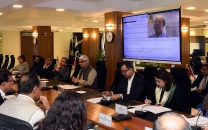Terrorism cases: Unfair to blame judges over delay in prosecution, says SC
Justice Nisar says civilian order lacks capacity to fight terror

Justice Mian Saqib Nisar.
Giving remarks over the establishment of military courts to try civilians on terrorism charges, Supreme Court judge Justice Mian Saqib Nisar on Thursday observed that the court should give tools to those [army], who take responsibility to fight against terror.
During the hearing of the 18th and 21st Constitutional Amendment case, he said terrorism has played havoc with the country as civilian order has no capacity to fight against terror. If someone has taken the responsibility (to fight terror), then the court can add tools to its weaponry in order to save the future generation as children were being killed.
However, another judge Justice Asif Saeed Khosa expressed wonder as to why judicial slot is required to fight terrorism. He also said that it is unfair to say that terrorism in the country flourishes because of courts. “Do not blame the judges,” he remarked.
More than 8,000 convicts on death row are because of the courts’ verdicts and if the government had not hanged them then it was not the judiciary’s fault, Justice Khosa said, adding that it is the executive that has failed.
He stated that every system has to deliver and the civil system has failed because of the executive, and not due to courts. It was the responsibility of the government to provide protection to witnesses, judges and prosecutors.
Justice Anwar Zaheer Jamali asked Khalid Anwar, counsel for the federal government, can he assure that Article 4 and 10A will not be violated during the trial of accused in military courts. He said the basic issue before the court is to provide justice and whether the Article 10A will be suspended for two years? The attorney stated that the country was facing incontrovertible situation: the economy, peace and tranquility all are disturbed.
He contended that the civilian order does not have capacity to control these things, adding that parliament being representative of people has restricted the Supreme Court to exercise its jurisdiction in the affairs of military courts.
Justice Ijaz Ahmed stated that being the in-charge of ATCs he interacted with various ATC judges and not a single judge told that he did not like to perform duties in the ATC. He added that not a huge number of cases are pending in the ATCs and if they have the list of pending cases then provide it to the apex court.
However, justice Qazi Faez Isa while referring to Article 245 said whether it is the job of an army official to perform the duty of a judge. “Why is the federal government putting burden on army officers to become judges,” he asked.
He said that the country was disintegrated in the period of military dictator and Swat was also captured by militants in the era of another military dictator. Chief Justice Nasirul Mulk asked whether the superior court can exercise their jurisdiction to examine verdicts given by military courts on the basis of mala fide and how the aggrieved persons can approach the courts.
However, the government attorney opposed the notion that courts have no power to exercise their jurisdiction. The hearing of case is adjourned till Monday.
Published in The Express Tribune, May 22nd, 2015.



















COMMENTS
Comments are moderated and generally will be posted if they are on-topic and not abusive.
For more information, please see our Comments FAQ